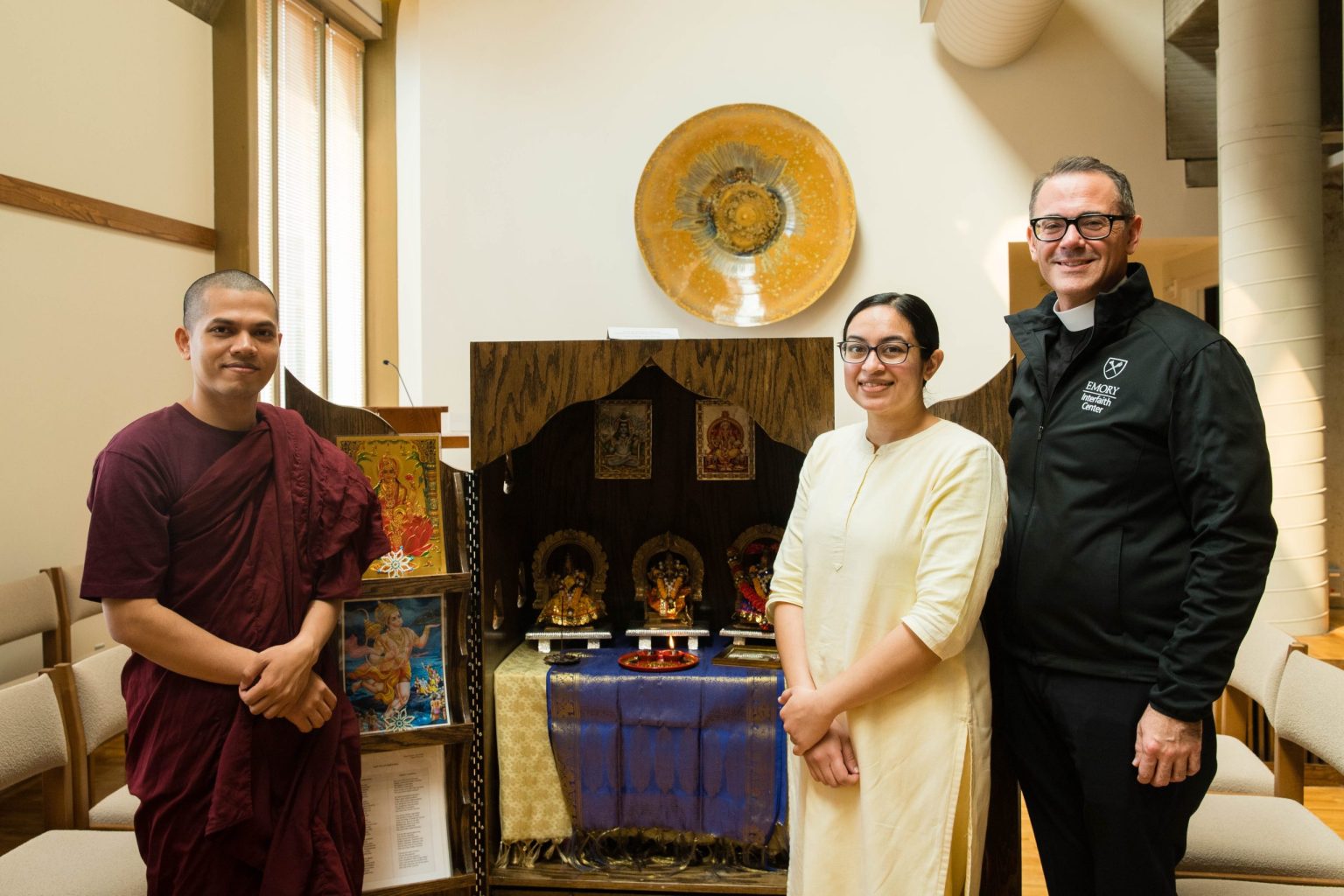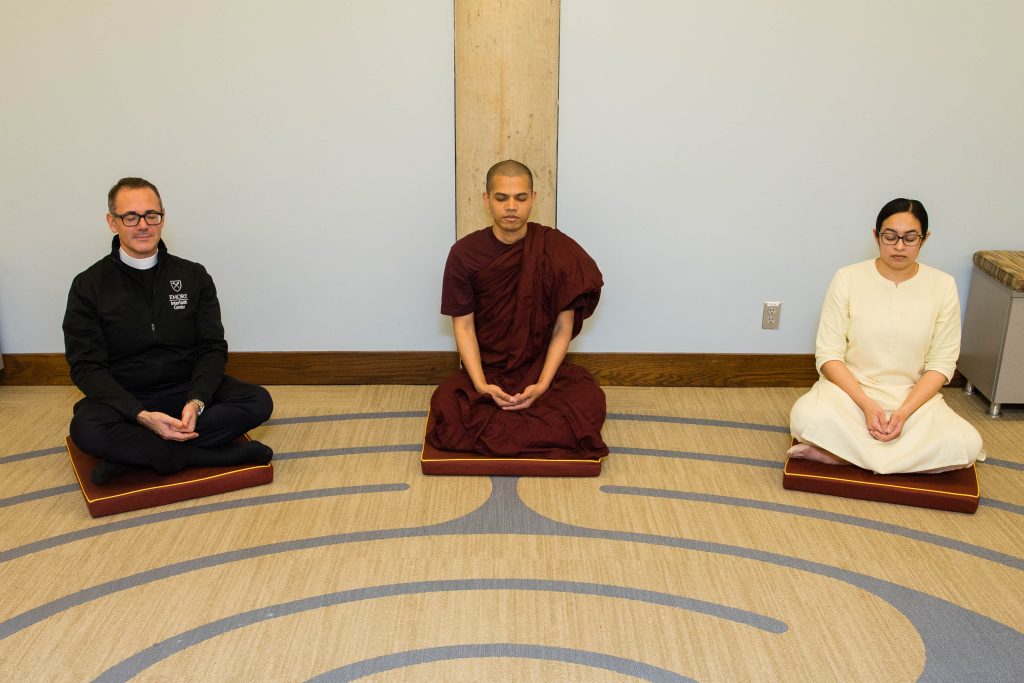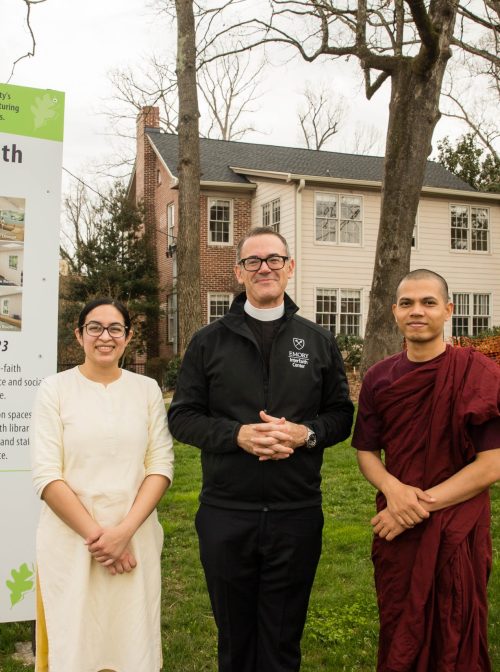Every day at work, the Reverend Doctor Greg McGonigle, Dean of Spiritual and Religious Life at Emory University, looks out his office window to see the campus’s Living Mandala.
One of only two Living Mandalas in the world blessed by Buddhist monks from Drepung Loseling Monastery, Emory’s Mandala is designed to inspire peace, compassion, and harmony—and it provides a place for students to meditate, venerate, and reflect. In many faiths, the circular design of the mandala symbolizes the sacred wholeness of the entire universe; the one at Emory also illustrates the sacred wholeness of the work of the Office of Spiritual and Religious Life (OSRL).
Emory’s OSRL is described as a “multifaith resource center that supports religious, spiritual, ethical, cultural life, learning, and exploration for anyone at Emory—students, faculty, and staff of all of Emory’s Schools.” It also has four key aims: support religious and philosophical communities, educate about spirituality and ethics in society and the world, provide pastoral care and opportunities to engage in service and social justice, and promote religious pluralism and interfaith engagement. The OSRL offers a wealth of resources, including weekly e-newsletters featuring opportunities for spiritual and social justice engagement; online and in-person worship, meditation, reflection, music, and learning; and chaplains or affiliates available for pastoral care or supportive check-ins.

The OSRL also supports more than 25 communities for students who identify with a range of worldviews, including Buddhism, Christianity, Hinduism, Interfaith, Islam, and Judaism. Some of these communities focus on Black spirituality, LGBTQ spirituality, and Native and Indigenous spirituality. Still others operate through Emory’s alumni networks, including groups focusing on alumni of different faiths as well as Voices of Inner Strength, Emory’s long-standing gospel choir comprised of people of many faiths. Taken together, the priorities and offerings of the OSRL illustrate Emory’s unique and deep-seated commitment to religious pluralism and students’ holistic well-being. Under McGonigle’s leadership, Emory’s OSRL is making sure students see themselves represented in the campus community—religiously, spiritually, ethically, racially, and culturally.
Ensuring Students Feel Seen
Reflecting on the work of the Office of Spiritual and Religious Life, Rev. Dr. McGonigle, who began his tenure at the university in 2019, emphasizes Emory’s significant history as a place welcoming to increased religious and philosophical diversity. An important part of this history was the tenure of the Reverend Susan Henry-Crowe, one of McGonigle’s predecessors, and this multi-faith vision has been championed by recent past and current Emory presidents. Reverend Henry-Crowe founded the Inter-Religious Council, a group of student representatives from all recognized religious and philosophical organizations on campus that is designed to foster a more positive campus climate. Meanwhile, a myriad of interfaith initiatives like the new WISE Pre-Orientation program are bringing together students with varied identities and beliefs, and the OSRL staff is evolving to include a growing number of chaplains who serve Emory’s increasingly diverse student body.

In a recent interview with Interfaith America, McGonigle emphasized the importance of hiring chaplains full time when possible to increase retention and ensure they had time to focus on supporting the whole Emory community, even those beyond their own traditions, by being fully present and engaged across campus. Each chaplain now serves as a liaison to one of Emory’s schools, which helps deepen relationships with students, faculty, and staff in different academic programs. Over the past three years, chaplains representing Hindu, Buddhist and Jewish traditions have been added to the OSRL team, which also includes a Christian chaplain and a Muslim scholar. The team is also comprised of music, administrative and program staff who make all of the office’s work possible.
Establishing New Structures of Support
Emory may have been the first university in the country to hire a full-time Buddhist chaplain, the Venerable Priya Sraman, and was only the fourth to hire a full-time Hindu chaplain, Brahmacharini Shweta Chaitanya. In a recent article, Rev. Dr. McGonigle underscored the importance of hiring Sraman and Chaitanya into these inaugural roles:
“The Buddhist, Hindu, and Muslim religions are much newer to becom[ing] established in the United States, and so they do not yet have the established structures that Christianity and Judaism have built over many years to support young adult and university religious life. If universities want to support the spiritual lives of our diverse campus communities, and to educate all of us in these ancient traditions of wisdom, the universities have to provide them.”
The Venerable Priya Sraman brings an array of identities and experiences to his chaplaincy role at Emory. Originally from Bangladesh, he studied at a Buddhist monastery from an early age, completed college in Thailand, and attended graduate school in Hong Kong. Before joining the Office of Spiritual and Religious Life, Sraman earned his master’s from Harvard Divinity School, where he developed an appreciation for the “shared experience of tolerance and meaningful connections.” This foundation has served Sraman well at Emory, where he and his colleagues encourage student engagement with “religious [and] spiritual tolerance and learning, curiosity, engagement, and social justice.”
Brahmacharini Shweta Chaitanya grew up in Texas. In her early years, she was influenced by the Varkaris, a tradition within Hinduism that her mother followed. Chaitanya began exploring coursework in South Asian studies in college, which ultimately led her to study at an ashram for several years. As a monastic, Chaitanya acknowledges that she “may present as … a religious person” but appreciates that “a lot of the stuff we do [through the OSRL] that could be labeled as non-religious actually really helps shape the culture that our office aims to create, which is openness and not rigidity.”
Both chaplains believe in the importance, not only of formal interfaith programming, but also of modeling collegiality and respect across religious and philosophical lines. When students visit the OSRL, they will commonly find chaplains “sitting in the lobby and just talking or chatting,” noted Sraman. “Students might not even interact with us, but seeing two different religious, spiritual leaders … having this interaction … I think it creates that tolerance in the minds of students which they have not seen before because a multifaith team is very new at Emory.”
Chaitanya reflected on what it means to have a presence on campus for the first time, and ways that old structures may need to adapt to make way for new ones. “The word chaplaincy is very new to Hindus and a lot of non-Christian traditions,” she explained. “A challenge is, though we may explicitly say we’re here for the community as dialogue partners, I think it is also an opportunity for the community to learn what a chaplain can do. This has been a mutual learning experience.”
Building Bridges Beyond Campus
When asked what lies ahead for the Office of Spiritual and Religious Life at Emory, Rev. Dr. McGonigle spoke about “deepening our connections with community partners” in Atlanta and beyond. He emphasized the potential for realizing OSRL’s vision more fully by connecting with organizations like Interfaith Atlanta and Compassionate Atlanta, two local interfaith and social justice organizations. According to McGonigle, building these bridges fits within the university’s broader strategic priorities, which include a commitment to “deepening its relationship with the city of Atlanta.” These community connections will also help McGonigle and his colleagues ensure that all Emory students have access to the networks, knowledge, and opportunities they need to thrive.
Rachel Tingley is a Program Manager at Interfaith America.
READ THE SERIES
Exploring AAPI Experiences of Religious Identity and Diversity

This article is part of Interfaith America’s AAPI qualitative research and storytelling initiative, which explores Asian American and Pacific Islanders’ experiences of religious identity and diversity in the United States. Stories published as part of this initiative offer key findings from the research and spotlight AAPI changemakers across different religious, civic, and professional sectors.




